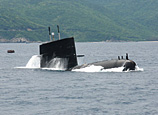
Key Words: UNCLOS; United Nations Convention on the Law of the Sea; Philippines; South China Sea;
Related Reading:
>> Philippines brings disputes with China to UN arbitral tribunal
>> China urges Philippines to avoid complicating disputes
>> Philippines moves in wrong direction
The situation in the South China Sea is easing but the Philippines run in the opposite direction in an attempt to internationalize the South China Sea issue.
The Philippines has recently reported the dispute with China on the South China Sea to the relevant United Nations agency. The Philippines will certainly not gain recognition from the United Nations for its misleading the public and illegal occupancy of some islands and reefs of China's Nansha Islands.
China has indisputable sovereignty over the Nansha Islands and its adjacent waters due to sufficient historical and legal bases. To settle disputes by negotiations among the sovereign states that directly relate to the South China Sea, and avoid taking any actions of complicating and expanding the problems is an important principle and spirit of the "Declaration on the Conduct of Parties in the South China Sea" and also the consensus reached by China and the ASEAN countries. The Philippine administration knew how the South China Sea dispute should be solved, therefore its behavior of using the Declaration on the Conduct of Parties in the South China Sea to embolden itself is self-contradiction.
It is hardly conducive to the solution of problems to intensify contractions and make troubles. People will see from the evolution of the Huangyan Island issue that the Philippines gets more and more passive since it plotted to internationalize the South China Sea dispute. The Philippines should realize that China has been pursuing a neighboring diplomacy of creating an amicable, secure and prosperous neighborhood, but it is impossible to make unprincipled concessions to the territorial integrity and sovereignty issues related to the core interests.
The Philippines had repeatedly called for the ASEAN countries to support its behaviors but always ended in failure. The cooperation between China and ASEAN is the mainstream, which is also the reason why the Philippines failed to get a response from other ASEAN countries when it made troubles on the South China Sea issue. The practice goes against the common interests of ASEAN.
At present, the situation in the South China Sea is easing, but the Philippines runs in the opposite direction. The Philippines' speaking ill of China and attempt of internationalizing the South China Sea issue will only deteriorate the China-Philippines relations and damage its interests and regional stability.
No matter what tricks the Philippines plays, it cannot change the fact that the Nansha Islands and its adjacent waters belong to China.
Read the Chinese version: 菲律宾的徒劳之举, source: People's Daily, author: Zhong Sheng
















 Beijing fantasy emerges in dense fog
Beijing fantasy emerges in dense fog


![]()
